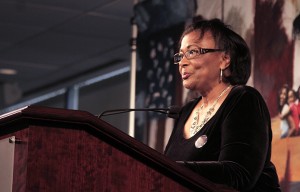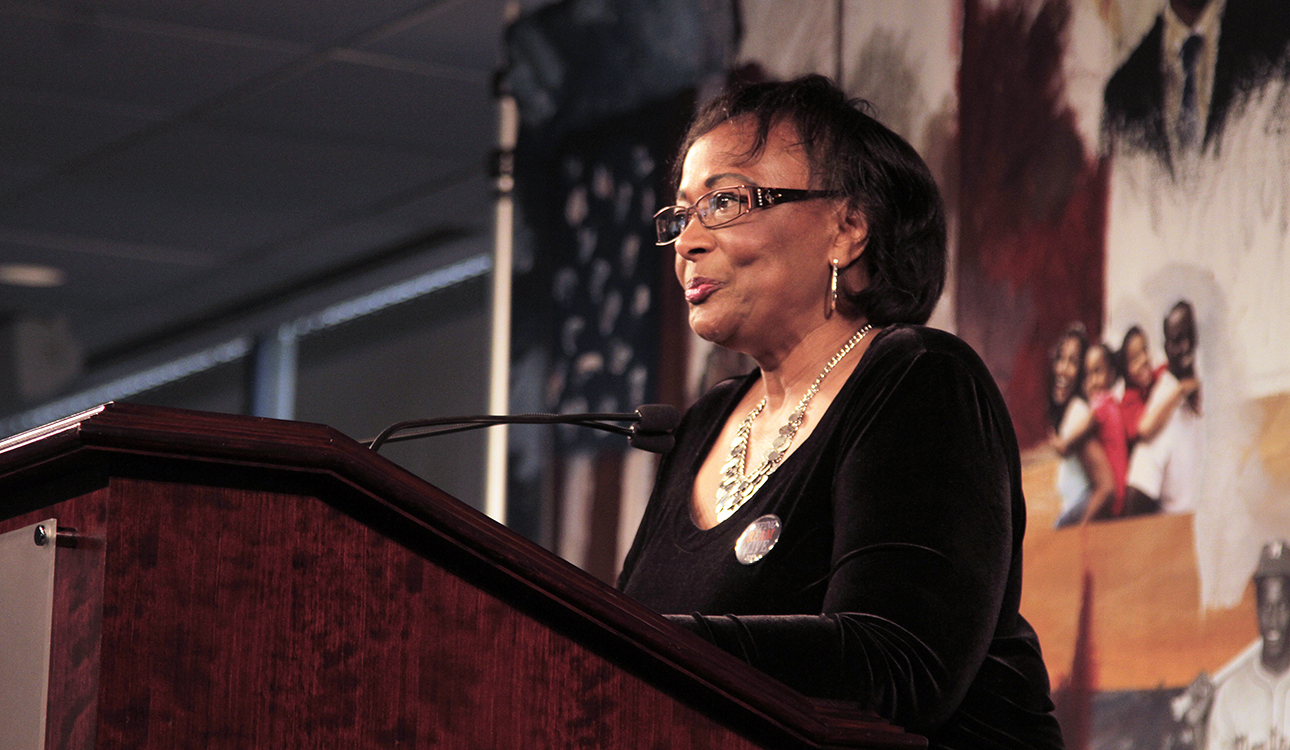
Travis Taylor | Lariat Photo Editor
By Paula Ann Solis
Staff Writer
She walked Baylor’s campus during the tumultuous civil rights era and made history in 1967 as the first African-American woman to graduate from a once whites-only college.
But before she did all of this, Barbara Walker was like everyone else in her Red Bird, Okla., town, working in the fields since she was 10 for 50 cents a day and fighting to contradict the expectation that she would never be more than a laborer for white farmers.
More than 50 years after forging the way for African-American women at Baylor, Walker is now a retired clinical social worker. She visited campus Wednesday as the keynote speaker for a Dr. Martin Luther King Jr. luncheon hosted by the multicultural affairs department.
Walker told her story to a room of more than 400 students and Waco residents. She chronicled her love for education from the time she was in a segregated kindergarten classroom to her integration into Baylor life while Dr. King’s national presence was a driving force through those difficult and frightening times.
“For the first time, we had a sense of pride in who we were as a race of people,” Walker said. “We could hold our heads up high and not feel bad about the color of skin. Just listening to his messages was so inspiring to all of us, and it helped us to see ourselves in a way that we had never seen ourselves before.”
Despite this inspiration from the national movement, Walker said she was not prepared for the culture shock she faced when she moved from Oklahoma to Waco to attend Paul Quinn College. After one year there, Baylor voted to integrate, so she transferred under the advisement of her professors.
Administrators, not the students, were the ones who struggled most with the idea of African-Americans on campus, Walker said.
“I found out that they had given me a private room, and so I was not going to tolerate that,” Walker said. “I told them, ‘I thought Baylor was integrated, and everyone was equal here.’”
The dean then asked the student body who would be willing to room with the “negro girl.” Volunteers were not a problem among the welcoming student body, and Walker began forming relationships that she has kept through the years.
Despite feeling resistance from professors and sometimes being ignored in class, Walker said she never once considered giving up and leaving just to make things easier on herself.
“It was so important to me to finish school because my mom had wanted so much to finish college, and I felt like what I accomplished she was accomplishing through me,” Walker said. “Quitting never occurred to me.”
Among those in the audience listening to Walker’s story of adversity was 2012 George W. Truett Theological Seminary graduate Omari Head, who said he has attended four King celebrations at Baylor in the past. However, this one held special meaning.
“It’s not everyday you get to be in the same room as the first African-American woman to graduate from Baylor,” Head said. “It’s hard to believe that it was just 50 years ago African-Americans were first allowed on campus. I’m just honored to be here and witness history in the making. This is a testament to the idea of keeping Dr. King’s dream alive.”
Also in the audience seated with Walker’s family and friends was her grandson, Phoenix freshman Kristoff Firedancing. Although Walker said she did not pressure Firedancing to attend Baylor, she is pleased to know the family legacy will finally continue.
Walker said she is working on an autobiography that will detail her childhood and time at Baylor, although she is not sure when it will be completed. Until then, Walker said she hopes to remind people of their duty to carry others through difficult times like Dr. King.
“I’d like for us to think of how we can continue the legacy of Dr. King to touch the lives of students and others by reaching out to those we see struggling or needing a word of encouragement,” Walker said. “We may only be there to plant the seed. Others further along the way may water that seed but remembering that God is the one that gives the increase at the appropriate time.”






